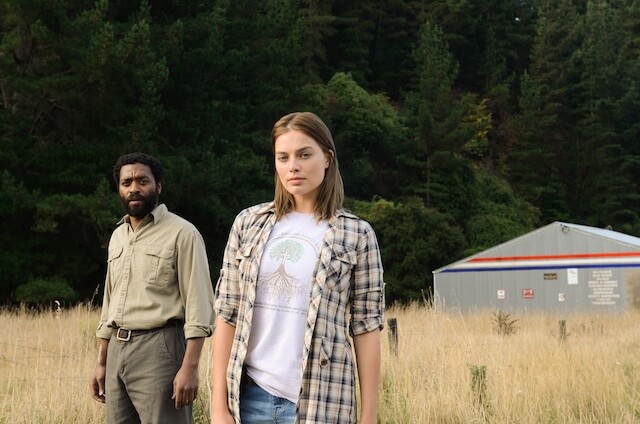‘Z for Zachariah’ The post-apocalyptic drama “Z for Zachariah” ends too abruptly and cleanly, but given how everything that precedes it is roomy and (in a great way) messy, the last minute stumble is almost forgivable. There are only three characters, and one of them doesn’t appear till around the hour mark. But even when it’s just two of them — young, deeply religious Ann (Margot Robbie) and John Loomis (Chiwetel Ejiofor), the potential last people on Earth — there’s so much going on it doesn’t need anymore. John stumbles upon Ann’s country home, nestled in a valley that’s mysteriously free of both other people and the toxins that appear to have wiped out humankind. They form an uneasy bond, first roomies forced together by happenstance, then potential lovers. One night John drunkenly makes a rebuffed pass at her. Later she makes a rebuffed pass at him. Sex between roommates, he argues, isn’t a good idea. Of course, even broaching the subject of hormones isn’t a good idea either, even when they can’t be ignored. “Z for Zachariah” isn’t much of a post-apocalypse, which is a good thing. Strip away the set-up and the pining for the destroyed past and you have a chamber drama with three actors. The third is Caleb (Chris Pine), a strapping stud who when he belatedly crops up quickly asserts himself as the alpha male to the detached, cautious, introspective John. Caleb thinks with his member, while Loomis is all brain. What was an anti-romance becomes a look at the pains of being trapped in a third wheel situation, complicated by anxieties around traditional masculinity. In the face of a real man, Loomis finds himself regretting his missed chance, and finds himself forgetting that he might just not be that into her anyway. RELATED: “Queen of Earth” is an uneasy study of Elisabeth Moss losing it This will all be tidily resolved, and slightly out of nowhere, but before then, for 85 percent of its run, the film gives great space to an acutely observed look at strained interaction, as well as at the actors themselves. What John and Ann say in dialogue doesn’t tend to matter. The film is a study of body language and of faces and of the way the actors say what they say. (Amazingly, the source is a young adult novel by Robert C. O’Brien, he of “Mrs. Frisby and the Rats of NIMH.” This film adaptation plays like it wouldn’t appeal to anyone under 25.) Pine is the weak link here, in part because he’s written as a one-note scoundrel. Caleb knows how to manipulate Ann by agreeing with her that the valley is toxin-free because of divine intervention, leaving John the odd man out, the one seeking a scientific explanation for the fantastic. The idea of introducing a broad cocksure type into a house of sensitive souls is a sound idea, and Ejiofor and Robbie continue knocking it out of the park. (Without words, Robbie intimates that Ann knows she’s been coarsely seduced but is doing so to shame John.) The psychological warfare is also what belatedly makes the presence of director Craig Zobel make sense. His last film, “Compliance,” explored the way normally sensible people can, baby step by baby step, come to rationalize the irrational. Here (and without giving too much away), the slide is into something more evil, but it also comes too late to be effective, either as drama or as an unnerving study of people heading to the dark side. It wraps things up right when it’s heading somewhere fascinating and useful. That doesn’t mean what preceded it wasn’t gangbusters.
Director: Craig Zobel
Stars: Chiwetel Ejiofor, Margot Robbie
Rating: PG-13
3 (out of 5) Globes
‘Z for Zachariah’ is better as drama than as post-apocalypse

Roadside Attractions
Follow Matt Prigge on Twitter @mattprigge


















